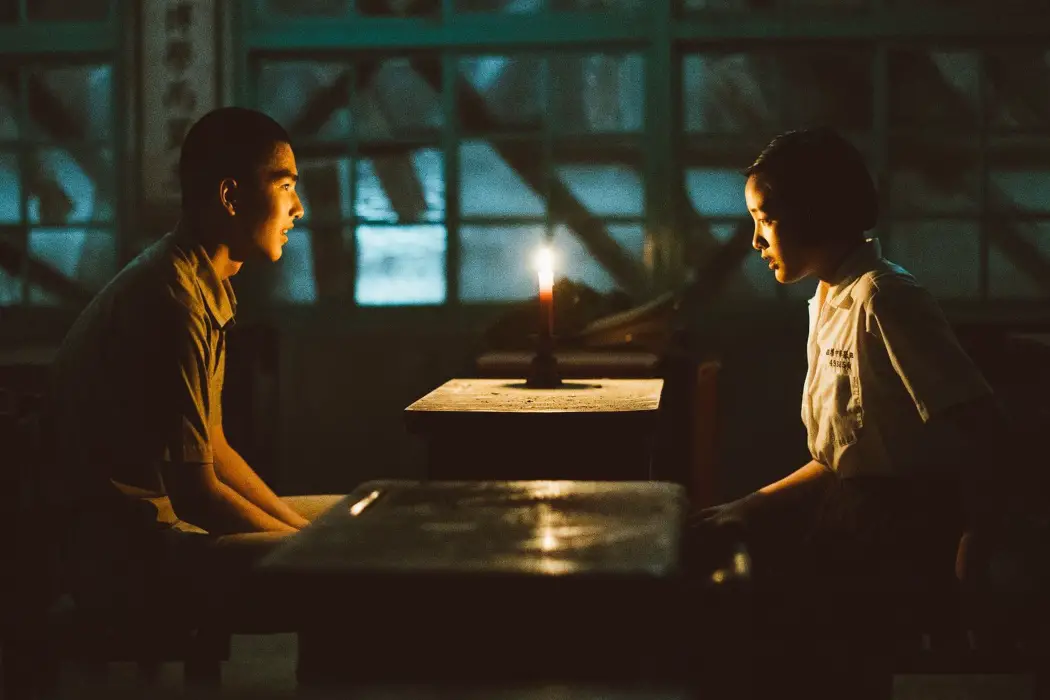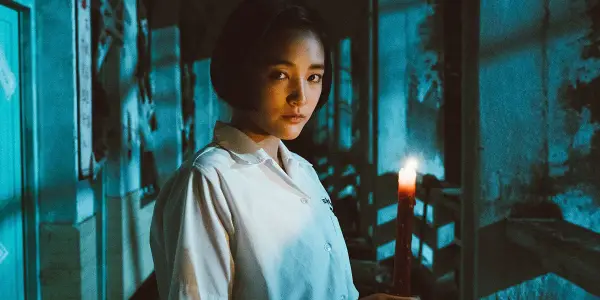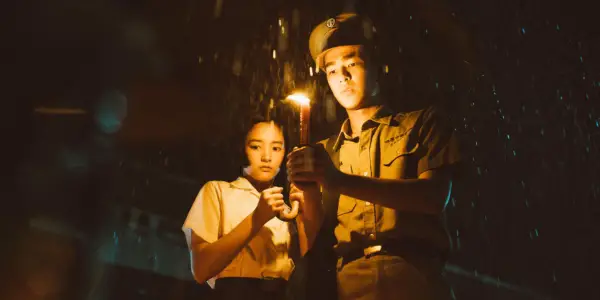Nightstream Film Festival 2020: DETENTION: A Taiwanese Horror That Deserves Demerits

Film critic, Ithaca College graduate, University of St Andrews masters…
Detention is a ghost story that’s pretty much atmosphere all the way down, more haunted house than horror film. It excels at presenting a ghoulish ambiance and creepy scenery, but when it has to make anything of its characters or plot, the film runs out of tricks.
Appropriately, Detention — which I saw at Nightstream’s Virtual Film Festival — is an adaptation of a hugely popular Taiwanese video game of the same name. The isolated setting, the big CG monsters, and the complete disregard for character growth all probably fare better in that medium than in live-action, where Detention can find neither coherence nor scariness.
Stuck In A Nightmare
In Taiwan in 1962, the White Terror had engulfed the island for 17 years. Taiwanese Nationalists imprisoned and executed anyone opposing their one-party rule, which meant that all Communist or left-wing materials were strictly banned, and those carrying them were punishable by death.
This authoritarian Taiwan is where Detention is set, and the politics of resistance are its narrative pulse. We mostly follow students and teachers in a banned books club at Greenwood High School. The club passes the time reading Rabindranath Tagore in the school’s storeroom, wary of the threat the state poses outside.

Wei Zhang-Ting (Jing-Hua Tseng) is one such rebel student. (Many of the character names vary slightly depending on which source you use; the names here come from the film’s subtitles.) Detention has a framing device that finds Wei after the authorities have forced the club to disband. Wei’s trapped in a government facility, where he’s tortured for information; so he dreams, hoping not only to escape but also to find out who informed the authorities about the book club.
In his nightmares, which comprise most of the film, he follows Fang Ray Shin (Gingle Wang), a student with her own buried traumas. Together, they scour their spooky abandoned school, though neither of them seems to have a plan. Dream logic reigns, so Fang and Wei tumble from one set piece to another, unearthing all manner of East Asian horror tropes along the way. A slim, pale schoolgirl with no face, resembling a gwisin, keeps following Fang. The custodian, who has a hole in his face where his right eye should be, chases the kids after they steal his keys. A slender, treelike police monster hunts the students through the halls.
For the first 20 minutes, though the plot barely makes sense, the scares are solid. Fang and Wei tiptoe through the school with only a slim red candle to light their way, and Fang catches glimpses of mysterious figures all around them — combined with the gwisin and the setting’s concrete brutalism, it all feels a bit like Fatal Frame.
Ghost School
Detention is the debut feature of John Hsu, who penned the script alongside Kai-Ling Fu and Shih-Keng Chien. Hsu delivers a sturdy intro, but the story has nowhere to go. If over half of your film is the torture-induced nightmare of one of your heroes, there aren’t many stakes for the dream-world — it’s the Sucker Punch problem, though at least Sucker Punch gives its heroes goals and lets Emily Browning punch a giant samurai.

The production design stands out as especially creepy and ghoulish, with phantasmic shadows dancing on the walls with Fang’s flickering candle. But the surplus of ghosts chasing our heroes through spooky hallways can’t make up for the utterly barren protagonists, who fail to provide the film with the emotional core it desperately needs.
The most the ghost school accomplishes is amplifying the paranoia of resistance and the terror of subverting the state at the cost of your life. The politics matter here more than the characters — tellingly, our final image is not a shot of either protagonist, but one of the words on a page saying, “To freedom.”
Conclusion
The narrative of Detention is nearly nonexistent. And in the rare instances that the story took center stage, I had no idea what to make of it. The characters are irritating when they aren’t just empty vessels to be scared, the plot grinds to a halt for the nightmare sequences, and the story bizarrely comes down to a romance between a student and their teacher, which I guess we were supposed to be rooting for the entire film.
Clearly, this story has worked overseas — in Taiwan and Hong Kong, the film is an award-winning hit. For me, the most effective scenes are the ones between the nightmares, when Fang’s disastrous home life comes into focus and we can better understand her complicated relationship with her older teacher, Mr. Zhang (Meng-Po Fu). These scenes are nearly broken by the same stylistic flourishes that define the nightmare sequences — slow-mo, jittery frame rates, and dream-logic editing — but these calmer personal scenes are also sincere and grounded in a way the nightmare isn’t.
Detention is better in concept than in execution. The story’s commitment to exploring the White Terror and its impact on Taiwanese youth is admirable, but there are no characters here capable of bearing such a heavy load. The ghosts and ghouls are fun, but this is ultimately supposed to be an allegory for Taiwanese oppression, and on those grounds, Detention fails.
Are you excited to see Detention? Or, if you’ve seen it, what are your thoughts on it? Sound off in the comments, and let us know.
Watch Detention
Does content like this matter to you?
Become a Member and support film journalism. Unlock access to all of Film Inquiry`s great articles. Join a community of like-minded readers who are passionate about cinema - get access to our private members Network, give back to independent filmmakers, and more.
Film critic, Ithaca College graduate, University of St Andrews masters student, head of the "Paddington 2" fan club.












